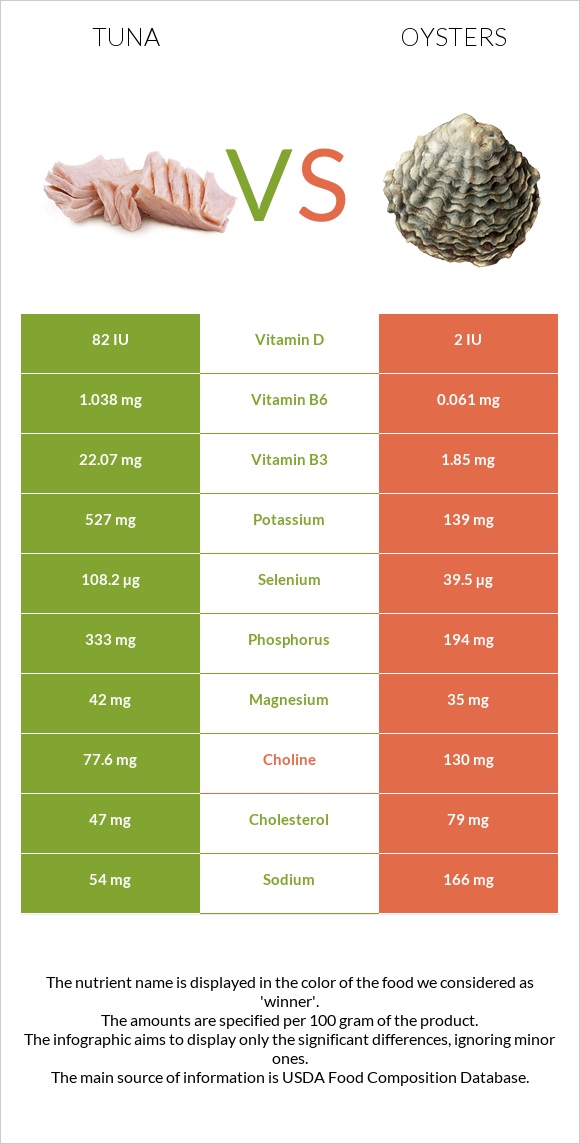Tuna vs. Oysters — In-Depth Nutrition Comparison
Compare
Significant differences between tuna and oysters
- Tuna has more vitamin B3, selenium, vitamin B6, phosphorus, and vitamin D; however, oysters is richer in zinc, vitamin B12, copper, iron, and manganese.
- Oysters covers your daily zinc needs 710% more than tuna.
- Oysters has 41 times less vitamin D than tuna. Tuna has 82 IU of vitamin D, while oysters has 2 IU.
Specific food types used in this comparison are Fish, tuna, yellowfin, fresh, cooked, dry heat and Mollusks, oyster, eastern, wild, cooked, moist heat.
Infographic

Infographic link
Mineral Comparison
Mineral comparison score is based on the number of minerals by which one or the other food is richer. The "coverage" charts below show how much of the daily needs can be covered by 300 grams of the food.
| Contains more MagnesiumMagnesium | +20% |
| Contains more PotassiumPotassium | +279.1% |
| Contains more PhosphorusPhosphorus | +71.6% |
| Contains less SodiumSodium | -67.5% |
| Contains more SeleniumSelenium | +173.9% |
| Contains more CalciumCalcium | +2800% |
| Contains more IronIron | +901.1% |
| Contains more CopperCopper | +13172.1% |
| Contains more ZincZinc | +17366.7% |
| Contains more ManganeseManganese | +4446.2% |
Vitamin Comparison
Vitamin comparison score is based on the number of vitamins by which one or the other food is richer. The "coverage" charts below show how much of the daily needs can be covered by 300 grams of the food.
| Contains more Vitamin DVitamin D | +∞% |
| Contains more Vitamin B1Vitamin B1 | +272.2% |
| Contains more Vitamin B3Vitamin B3 | +1093% |
| Contains more Vitamin B6Vitamin B6 | +1601.6% |
| Contains more Vitamin AVitamin A | +18.2% |
| Contains more Vitamin EVitamin E | +486.2% |
| Contains more Vitamin B2Vitamin B2 | +31.4% |
| Contains more Vitamin B5Vitamin B5 | +33.8% |
| Contains more Vitamin B12Vitamin B12 | +644.7% |
| Contains more Vitamin KVitamin K | +1900% |
| Contains more FolateFolate | +600% |
All nutrients comparison - raw data values
| Nutrient |  |
 |
DV% diff. |
| Zinc | 0.45mg | 78.6mg | 710% |
| Vitamin B12 | 2.35µg | 17.5µg | 631% |
| Copper | 0.043mg | 5.707mg | 629% |
| Vitamin B3 | 22.07mg | 1.85mg | 126% |
| Selenium | 108.2µg | 39.5µg | 125% |
| Iron | 0.92mg | 9.21mg | 104% |
| Vitamin B6 | 1.038mg | 0.061mg | 75% |
| Protein | 29.15g | 11.42g | 35% |
| Manganese | 0.013mg | 0.591mg | 25% |
| Phosphorus | 333mg | 194mg | 20% |
| Cholesterol | 47mg | 79mg | 11% |
| Calcium | 4mg | 116mg | 11% |
| Potassium | 527mg | 139mg | 11% |
| Vitamin D | 82 IU | 2 IU | 10% |
| Vitamin D | 2µg | 0µg | 10% |
| Choline | 77.6mg | 130mg | 10% |
| Vitamin E | 0.29mg | 1.7mg | 9% |
| Vitamin B1 | 0.134mg | 0.036mg | 8% |
| Polyunsaturated fat | 0.175g | 1.056g | 6% |
| Sodium | 54mg | 166mg | 5% |
| Fats | 0.59g | 3.42g | 4% |
| Vitamin B2 | 0.137mg | 0.18mg | 3% |
| Folate | 2µg | 14µg | 3% |
| Saturated fat | 0.205g | 0.948g | 3% |
| Carbs | 0g | 5.45g | 2% |
| Magnesium | 42mg | 35mg | 2% |
| Vitamin B5 | 0.334mg | 0.447mg | 2% |
| Vitamin K | 0.1µg | 2µg | 2% |
| Calories | 130kcal | 102kcal | 1% |
| Monounsaturated fat | 0.138g | 0.506g | 1% |
| Protein per 100 calories | 22.423076923076923g | 11.196078431372548g | N/A |
| Calories per 10 g protein | 44.59691252144083kcal | 89.3169877408056kcal | N/A |
| Net carbs | 0g | 5.45g | N/A |
| Sugar | 0g | 1.23g | N/A |
| Starch | 0.9g | 0% | |
| Vitamin A | 22µg | 26µg | 0% |
| Trans fat | 0.02g | 0.068g | N/A |
| Tryptophan | 0.313mg | 0.138mg | 0% |
| Threonine | 1.224mg | 0.046mg | 0% |
| Isoleucine | 1.287mg | 0.459mg | 0% |
| Leucine | 2.27mg | 0.716mg | 0% |
| Lysine | 2.565mg | 0.762mg | 0% |
| Methionine | 0.827mg | 0.257mg | 0% |
| Phenylalanine | 1.091mg | 0.413mg | 0% |
| Valine | 1.438mg | 0.523mg | 0% |
| Histidine | 0.822mg | 0.22mg | 0% |
| Omega-3 - EPA | 0.015g | 0.353g | N/A |
| Omega-3 - DHA | 0.105g | 0.271g | N/A |
| Omega-3 - ALA | 0.163g | N/A | |
| Omega-3 - DPA | 0.005g | 0.02g | N/A |
| Omega-3 - Eicosatrienoic acid | 0.004g | N/A | |
| Omega-6 - Gamma-linoleic acid | 0.004g | N/A | |
| Omega-6 - Dihomo-gamma-linoleic acid | 0.007g | N/A | |
| Omega-6 - Eicosadienoic acid | 0.002g | 0.007g | N/A |
| Omega-6 - Linoleic acid | 0.061g | N/A |
Macronutrient Comparison
Macronutrient breakdown side-by-side comparison
| Contains more ProteinProtein | +155.3% |
| Contains more FatsFats | +479.7% |
| Contains more CarbsCarbs | +∞% |
| Contains more WaterWater | +13.4% |
| Contains more OtherOther | +18.8% |
Fat Type Comparison
Fat type breakdown side-by-side comparison
| Contains less Sat. FatSaturated fat | -78.4% |
| Contains more Mono. FatMonounsaturated fat | +266.7% |
| Contains more Poly. FatPolyunsaturated fat | +503.4% |





